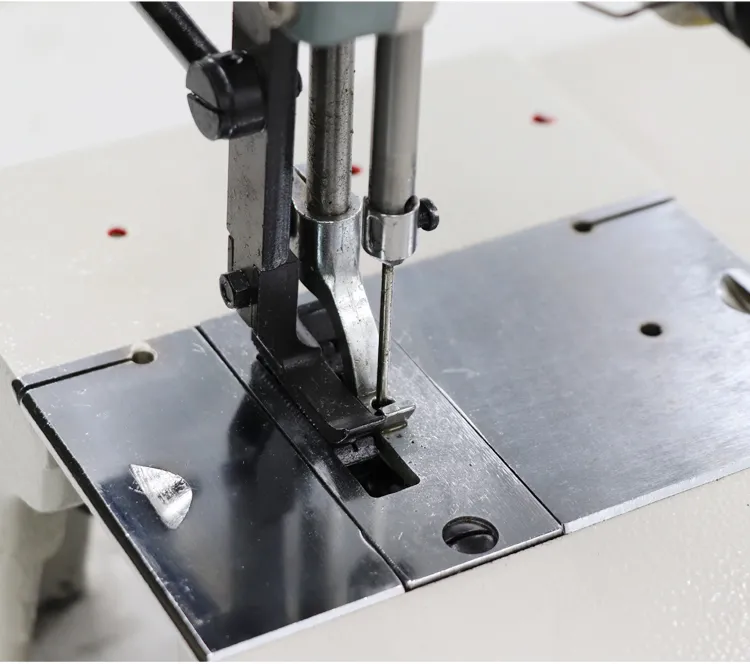heavy material sewing machine
Heavy Material Sewing Machines Power and Precision for Industrial Applications
In the world of sewing and textiles, the importance of the right equipment cannot be overstated, especially when it comes to heavy material sewing machines. These robust machines are designed to handle dense fabrics and materials that traditional sewing machines simply cannot manage. From upholstery to industrial workwear, heavy material sewing machines play a crucial role in various sectors, enabling manufacturers to produce high-quality products with efficiency and precision.
Understanding Heavy Material Sewing Machines
Heavy material sewing machines are engineered specifically for sewing thick, heavy fabrics such as canvas, leather, denim, and multi-layered materials. They differ significantly from standard sewing machines in several key aspects construction, needle size, and stitch types. Typically, these machines feature a more powerful motor that provides higher torque, allowing them to penetrate difficult materials. Furthermore, heavy-duty sewing machines use larger needles designed to accommodate the thickness of the fabric, ensuring smooth stitching without breaking threads.
One significant characteristic of these machines is the feed system. Many heavy material sewing machines employ a walking foot or compound feed system, which helps move the fabric through the machine during the sewing process. This feature is essential when dealing with thick layers, as it minimizes the risk of puckering and uneven seams, ensuring professional-quality results every time.
Applications in Various Industries
Heavy material sewing machines are widely used across several industries, including upholstery, automotive, marine, and military applications. In upholstery, for instance, manufacturers often need to sew together thick materials like leather or canvas for furniture, drapery, and soft furnishings. A reliable heavy material sewing machine allows them to create durable and aesthetically pleasing products.
In the automotive industry, heavy-duty machines are critical for assembling seat covers, carpets, and other elements made from thick fabric materials. These applications require not only strength but also precision stitching to ensure safety and durability. The same principle applies in the marine industry, where heavy material sewing machines are used to craft sails, boat covers, and other heavy-duty marine textiles that withstand varying weather conditions.
heavy material sewing machine

Military applications further highlight the significance of these machines. The production of uniforms, protective gear, and tactical equipment often requires sewing techniques that can handle multiple layers of heavy-duty fabrics. Heavy material sewing machines guarantee that these essential items are built to last, meeting strict durability and safety standards.
Choosing the Right Heavy Material Sewing Machine
Selecting the appropriate heavy material sewing machine is crucial for meeting specific production needs. When considering a purchase, it’s important to evaluate the types of materials you will be working with, the maximum thickness of the fabric, and the necessary features you require, such as automatic threading, adjustable stitch length, and tension control.
Brands such as Juki, Brother, and Consew are well-known for producing high-quality heavy material sewing machines. They offer models with various features tailored to different sewing needs, from basic stitching to advanced designs. It’s advisable for buyers to understand their workflow and budget before making a decision, as investing in a reliable heavy material sewing machine can drastically improve productivity and output quality.
Maintenance and Care
Like any machinery, heavy material sewing machines require regular maintenance to ensure optimal performance. Routine tasks include cleaning the machine, oiling moving parts, and promptly replacing worn-out needles and thread. Proper care not only extends the machine's lifespan but also maintains the quality of the finished product. Users should consult the machine’s manual for specific maintenance guidelines and seek professional servicing if they encounter significant issues.
Conclusion
In conclusion, heavy material sewing machines are indispensable tools in many manufacturing industries, offering the power and precision needed to work with thick fabrics. By understanding their features and applications, businesses can make informed decisions when investing in this equipment. With the right heavy material sewing machine, manufacturers can enhance their production capabilities, ensuring high-quality, durable products that meet customer demands. Whether it’s for upholstery, automotive, or military applications, these machines exemplify the intersection of technology and craftsmanship, paving the way for innovations in sewing and textiles.
-
Heavy Duty Leather Sewing Machine: A Must-Have for Professional LeatherworkNewsMay.28,2025
-
Leather Sewing Machine: Essential for High-Quality LeathercraftNewsMay.28,2025
-
Extra Heavy Duty Sewing Machine for Premium Leather ApplicationsNewsMay.28,2025
-
Walking Foot Cylinder Arm Sewing Machine: Precision and Power CombinedNewsMay.28,2025
-
Industrial Cylinder Arm Sewing Machine: Engineered for High-Performance StitchingNewsMay.28,2025
-
Cylinder Bed Sewing Machine: A Powerful Solution for Precision StitchingNewsMay.28,2025
-
Zigzag Sewing MachineNewsMay.12,2025





























